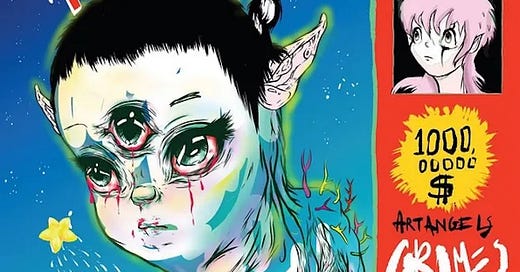REVIEW: Art Angels - Grimes
Claire Boucher’s fourth studio album is a beautifully chaotic amalgamation of bubblegum pop, anime, feminism and screaming.
9.4/10
Claire Boucher’s fourth studio album is a beautifully chaotic amalgamation of bubblegum pop, anime, feminism and screaming. Art Angels is audacious in challenging every preconceived notion about Grimes’ identity, the kind of music she makes, and her status as a D.I.Y. musician. Most evident on the bloodsucking-screamo-club-stomper Kill V. Maim which Grimes states she wrote to spite a male producer who told her she made “cute music.” Grimes effectively weaves intense bass heavy tracks like Kill V. Maim and a collaboration with Janelle Monaé on Venus Fly with the soft and tender such as Belly of the Beat and Life in the Vivid Dream where Grimes croons over her love of music and the existential threat of climate change respectively. Although this is impressive, the bulk of the album is made of an ethereal anime-esque sound such as on World Princess part II which easily sounds like it could be the theme to a sailor moon reboot. This bubblegum sound showcases how Grimes doesn’t need to sacrifice her “cute” sound in favour of something more aggressive: she can do both. The dichotomy of cute versus aggressive is ever-present in Art Angels however is never in conflict, Grimes blends both seamlessly into one cohesive sound and never falters on pacing, something that many artists aim to achieve but can never quite grasp.
While much of Boucher’s earlier work was rooted in synths, many of the tracks on Art Angels rely on guitar like on California, which has Grimes calling out the toxicity of Pitchfork over a peppy-country-adjacent sound. California is arguably one of the most impressive tracks on the album, with some mistakenly claiming that Grimes used a sample because of its use of Diwali Riddim. Although Grimes demonstrates a shift towards the guitar, she still refines her use of synths like on Realiti, a track so polished it’s practically gleaming. Realiti is the final version of an earlier demo that Boucher released in early 2015. It was only included on the album after the demo and music video ripped its way through Tumblr and amassed millions of views on YouTube. When compared to the demo, the album version of Realiti exchanges soft nostalgia for a bright bubblegum anime aesthetic which fits right at home on Art Angels but is so far removed from the original that they have essentially morphed into completely different songs but is nevertheless an impressive addition to the record.
“I’ll never be your dream girl” Grimes declares on Butterfly, the final track of Art Angels. Boucher perfectly sums up the thesis of the record on Butterfly, transcending other peoples preconceptions about your identity. In essence, she has done exactly this by creating an intricate record with so many elements that some artists could only dream of producing, writing, engineering and performing entirely by themselves. When compared to her first three records, this is sleeker, polished, more refined; so much so that if you lined up each of her albums from Geidi Primes to Art Angels you can witness every aspect of her musicality evolve with Art Angels being the pinnacle of Boucher’s pop evolution.




